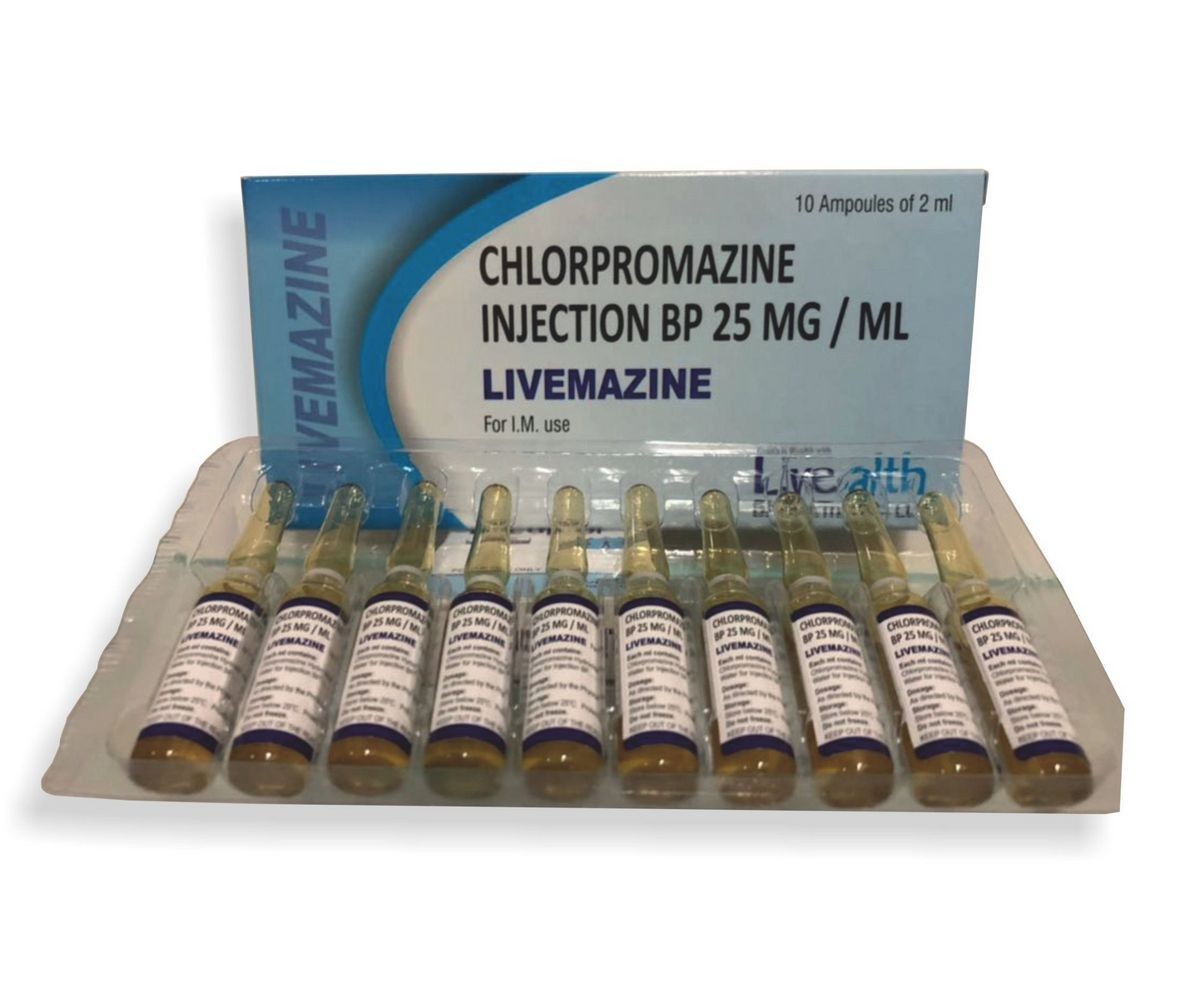
Contents
Chlorpromazine-Injection, Thorazine
Medication Uses How To Use Side Effects Precautions Drug Interactions Overdose Notes Missed Dose Storage Medical Alert USES: Chlorpromazine is used to treat certain mental or emotional conditions. It is also used to control hiccups, reduce anxiety, and treat nausea and vomiting. HOW TO USE: This medication can be given as an injection into a vein (intravenously) after dilution or into a muscle (intramuscularly). The patient should remain lying down for at least 30 minutes after the injection. In the treatment of mental or emotional conditions, it may take up to two weeks for the full benefit of this medication to take effect. SIDE EFFECTS: Constipation, drowsiness, vision changes, or dry mouth may occur. If any of these effects persist or worsen, notify your doctor. Unlikely to occur but report promptly: restlessness, muscle stiffness, difficulty speaking, loss of balance, mask-like facial expression, trembling or shaking, dizziness, uncontrollable movements, difficulty urinating, skin rash/discoloration. Very unlikely to occur but report promptly: sore throat, unusual bleeding or bruising, stomach pain, yellowing of eyes or skin, dark urine, hot dry skin, vomiting. Though very unlikely to occur, notify your doctor immediately if you experience any of the following effects: severe muscle stiffness, confusion, fever, seizures, irregular/fast heartbeat, increased sweating, prolonged/painful erection. In the unlikely event you have an allergic reaction to this drug, seek immediate medical attention. Symptoms of an allergic reaction include: rash, itching, swelling, dizziness, trouble breathing. If you notice other effects not listed above, contact your doctor or pharmacist. PRECAUTIONS: Tell your doctor your medical history, especially of: very high or very low blood pressure, liver or heart disease, Reye’s syndrome, alcohol or drug dependencies, nervous system problems, blood disorders, allergies (especially drug allergies). Use caution performing tasks that require alertness, such as driving or using machinery. Use of alcohol can cause extreme drowsiness. Avoid alcohol consumption. This medication may increase sensitivity to sunlight. Avoid prolonged sun exposure and wear sunscreen and protective clothing when exposed to the sun. This medication can reduce sweating, making you more susceptible to heat stroke. Avoid strenuous work or exercise in hot weather. A preservative (benzyl alcohol) that may be found in this product or in the liquid used to mix this product (diluent) can infrequently cause serious problems (sometimes death) if given in large amounts (more than 100 mg/kg daily) to an infant during the first months of life (neonatal period). The risk is also greater with low birth weight infants. Symptoms include sudden gasping, low blood pressure, or a very slow heartbeat. Report these symptoms to the doctor immediately should they occur. If possible, a preservative-free product should be used when treating neonates. The manufacturer of this drug does not recommend its use during pregnancy. However, it may be used in certain cases. Discuss the risks and benefits with your doctor. Chlorpromazine is excreted into breast milk and may have undesirable effects on a nursing infant. Consult your doctor before breastfeeding.
DRUG INTERACTIONS: Inform your doctor about all the medications you use (both prescription and nonprescription), especially of: anti-depressant/anti-anxiety drugs, sparfloxacin, grepafloxacin, guanethidine, guanadrel, metrizamide, cabergoline, lithium, beta-blockers (e.g., propranolol), narcotic pain medication (e.g., codeine), drugs used to aid sleep, drowsiness-causing antihistamines (e.g., diphenhydramine), other drugs that make you drowsy. Many cough-and-cold products contain ingredients that may add a drowsiness effect. Before using cough-and-cold medications, ask your doctor or pharmacist about the safe use of those products. Do not start or stop any medicine without doctor or pharmacist approval. OVERDOSE: If overdose is suspected, contact your local poison control center or emergency room immediately. US residents can call the US national poison hotline at 1-800-222-1222. Canadian residents should call their local poison control center directly. Symptoms of overdose may include restlessness, muscle spasms, tremors, twitching, deep sleep or loss of consciousness, and seizures. NOTES: Keep all doctor appointments because it is important you be closely monitored. MISSED DOSE: If you miss a dose and use 1 dose daily: use it as soon as remembered unless it is almost time for the next dose. In that case, skip the missed dose and resume your usual schedule. If you take more than 1 dose daily: use it as soon as possible if it is within an hour or so of the missed dose. If not remembered within an hour, skip the missed dose and resume your usual dosing schedule. Do not double the dose to catch up. STORAGE: Store at room temperature away from sunlight and moisture. Do not store in the bathroom. Do not freeze. MEDICAL ALERT: Your condition can cause complications in a medical emergency. For enrollment information, call MedicAlert at 1-800-854-1166 (USA), or 1-800-668-1507 (Canada).
QUESTION
Related Disease Conditions
Heat Rash: Symptoms and Treatment
Heat rash is a skin irritation caused by excessive sweating. It can occur at any age and appears as a rash that itches or feels prickly, and looks like a red cluster of pimples or small blisters. Heat rash remedies include OTC creams and sprays. Usually heat rash resolves when the skin is cooled sufficiently. Medical treatment may be necessary if the sweat glands become infected.
Panic Attacks
Panic attacks are sudden feelings of terror that strike without warning. These episodes can occur at any time, even during sleep. A person experiencing a panic attack may believe that he or she is having a heart attack or that death is imminent. The fear and terror that a person experiences during a panic attack are not in proportion to the true situation and may be unrelated to what is happening around them. Most people with panic attacks experience several of the following symptoms: racing heartbeat, faintness, numbness or tingling in the hands and fingers, chills, chest pains, difficulty breathing, and a feeling of loss or control. There are several treatments for panic attacks.
Nausea and Vomiting
Nausea and vomiting are symptoms of many conditions including motion sickness, pregnancy, emotional stress, gallbladder disease, and other illnesses. Learn about causes, treatment, and when to be concerned.
Migraine vs. Headache: Differences and Similarities
Headaches are the most common reason why a person goes to the doctor or other healthcare professional for treatment. There are different types of headaches, for example, migraine, tension, and cluster headaches. The most common type of headache is tension headache. Migraine is much less common. There are few similarities between migraine and other headaches, for example, the severity of the pain can be the same, mild, moderate, or severe; and they can occur on one side or both sides of the head. However, there are many differences between migraine and other types of headaches. Migraine headaches also have different names, for example, migraine with aura and menstrual migraine. Symptoms of migraine that usually aren’t experienced by a person with another type of headache include nausea, vomiting, worsens with mild exercise, debilitating pain, eye pain, throbbing head pain. Migraine triggers include light, mild exercise, strong smells, certain foods like red wine, aged cheese, smoked meats, artificial sweeteners, chocolate, alcohol, and dairy products, menstrual period, stress, oversleeping, and changes in barometric pressure. Untreated migraine attacks usually last from 4 to 72 hours, but may last for weeks. Most headaches resolve within 24-48 hours. Doctors don’t know exactly what causes migraine headaches; however, other headaches like tension headaches have more specific triggers and causes. Additional tests are usually required to diagnose migraine from other types of headaches, diseases, or other medical problems. Most headaches can be treated and cured with home remedies like essential oils, massage, and over-the-counter pain medication like acetaminophen (Tylenol) and NSAIDs (nonsteroidal anti-inflammatory drugs) like naproxen (Aleve, Anaprox, Naprosyn) or ibuprofen (Advil, Midol, Motrin). Most headaches resolve with OTC and home remedy treatment, while your doctor may need to prescribe medication to treat your migraines. If you have the "worst headache of your life," seek medical care immediately.


